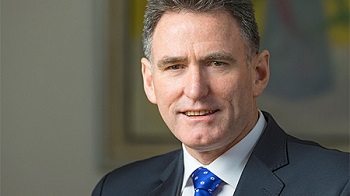RBS issues Brexit warning and special dividend as profits double

Ross McEwan
Still more than 60 per cent taxpayer-owned Royal Bank of Scotland has announced today it plans to pay embattled shareholders a special dividend as it posted a doubling of profits.
The Edinburgh-based lender made the announcement as it revealed that operating profit rose 50 per cent to £3.3 billion in the year to the end of December.
Alongside the results, RBS said that it planned to pay an annual dividend of 3.5p and a special dividend of 7.5p, taking total payouts including an earlier interim dividend to 13p per share.
Chief Executive, Ross McEwan, said: “This is a good performance in the face of economic and political uncertainty, with bottom line profits more than double what we achieved the previous year.
“We are also announcing an intention to pay back more capital to shareholders and almost £1bn is set to be returned to UK taxpayers for 2018.
“With strong capital and liquidity levels, we are well positioned to support the UK economy. Our total lending to business and commercial customers reached over £100bn at the end of 2018.”
However, competition in the mortgage market meant profit margins remained thin, it said.
Its net interest margin - the difference between what it pays for deposits and what it charges for loans, and a key measure of a bank’s ability to make money - shrank to 1.98 per cent from 2.13 per cent.
Meanwhile, while the bank stressed that no more of its branches will close in the next two years, it has continued with its plan to shrink itself.
Its assets, which in banking largely means its outstanding loans, shrank from £738.1bn to £694.2bn.
Before the financial crisis, and its £45bn taxpayer bailout, it was briefly the largest bank in the world by assets.
The bank said the switch from physical to digital services -which has driven the recent trend of branch closures - was continuing to grow rapidly with 6.4 million customers now regularly using its mobile app, a 16 per cent rise from 2017.
But it gave a severe assessment of the risks presented by cyberattacks.
It said such attacks were increasing in frequency, sophistication, impact and severity.
The group’s annual report also showed the chief executive’s pay package for 2018 rose to £3.6m from £3.5m a year earlier because of higher payouts from his long-term incentive plan. RBS also revealed a £7m drop in the bonus pool for employees, to £335m.
RBS reported a narrower gender pay gap, with female employees earning 36.6 per cent less than their male colleagues on average, compared with 37.2% a year earlier. However, on a median basis, women earned 36.8 per cent less than men at RBS, up from 36.5 per cent in 2017.
RBS has already set aside an extra £100m to cover potential bad loans in light of market uncertainty over Brexit.
The bank’s contingency plans have meant bulking up its office in Amsterdam, where RBS has applied to shift about £13bn – accounting for £6bn of client assets and £7bn in liabilities – from its UK business to the new EU hub.
RBS said on Friday it was in the final stages of getting the green light for two branches in Frankfurt that will be ready to clear euro payments “if required”.
The bank warned: “Given the quantum of affected payments and lack of short-term contingency arrangements, in the event that such euro-clearing capabilities were not in place in time for a hard Brexit … it could have a material impact on the group and its customers.”
Donald Brown, senior investment manager at Brewin Dolphin Scotland, said: “RBS beat forecasts by more than doubling profits in 2018, which reached £1.62 billion. The good news for shareholders is a final dividend of 3.5p per share, topped up by a special dividend of 7.5p per share. The UK Government, which still has a 62 per cent share in the bank, will see £977 million flow into the public purse – but a further sale of the government’s stake could be in the offing, with the bank securing approval for a share buyback scheme. While there are clearly challenges ahead – RBS’s net interest rate margin decreased and it highlighted the additional costs Brexit will bring – this is a good set of results. However, the share price will likely continue to be weighed down until the government begins disposing of its stake in the bank.”





